Road Town
Road Town, located on Tortola, is the capital of the British Virgin Islands. It is situated on the horseshoe-shaped Road Harbour in the centre of the island's south coast. The population was about 15,000 in 2018.[2]
Road Town | |
|---|---|
Town | |
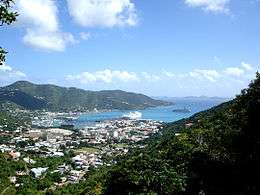 Road Town, Tortola | |
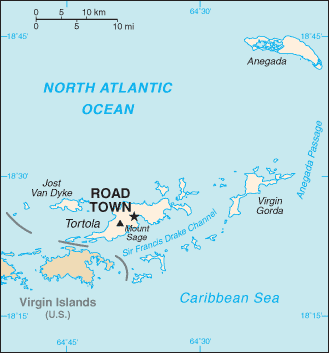 Map showing Road Town within the BVI | |
| Coordinates: 18°25′53″N 64°37′23″W | |
| Country | |
| British Overseas Territory | |
| Island | Tortola |
| Elevation | 10 m (30 ft) |
| Population (2012)[1] | |
| • Total | 12,603 |
| Postal Code | VG1110 |
The name is derived from the nautical term "the roads", a place less sheltered than a harbour but which ships can easily get to. A 28 hectares (69 acres) development called Wickham's Cay,[3] consisting of two areas that were reclaimed from the sea and a marina, have enabled Road Town to emerge as a haven for yacht chartering and a centre of tourism.[4][5] This area is the newest part of the city and the hub for the new commercial and administrative buildings of the BVI. The oldest building in Road Town, HM Prison on Main Street, was built in 1774.[6]
Climate
The British Virgin Islands enjoy a tropical climate, moderated by trade winds. Temperatures vary little throughout the year. In the capital, Road Town, typical daily maxima are around 32 °C (89.6 °F) in the summer and 29 °C (84.2 °F) in the winter. Typical daily minima are around 24 °C (75.2 °F) in the summer and 21 °C (69.8 °F) in the winter. Rainfall averages about 1,150 mm (45.3 in) per year, higher in the hills and lower on the coast. Rainfall can be quite variable, but the wettest months on average are September to November and the driest months on average are February and March. Hurricanes occasionally hit the islands, with the hurricane season running from June to November.
| Climate data for Virgin Gorda, British Virgin Islands | |||||||||||||
|---|---|---|---|---|---|---|---|---|---|---|---|---|---|
| Month | Jan | Feb | Mar | Apr | May | Jun | Jul | Aug | Sep | Oct | Nov | Dec | Year |
| Record high °C (°F) | 33 (91) |
32 (89) |
32 (89) |
35 (95) |
34 (93) |
35 (95) |
35 (95) |
36 (96) |
35 (95) |
33 (92) |
33 (91) |
31 (87) |
36 (96) |
| Average high °C (°F) | 26 (79) |
27 (80) |
28 (82) |
29 (84) |
29 (85) |
30 (86) |
31 (87) |
31 (87) |
30 (86) |
29 (85) |
28 (82) |
27 (80) |
29 (84) |
| Average low °C (°F) | 20 (68) |
19 (67) |
20 (68) |
21 (69) |
22 (71) |
23 (73) |
23 (73) |
23 (73) |
23 (73) |
22 (72) |
22 (71) |
21 (69) |
22 (71) |
| Record low °C (°F) | 17 (62) |
16 (60) |
16 (60) |
17 (62) |
18 (64) |
18 (65) |
19 (66) |
19 (66) |
16 (61) |
18 (64) |
17 (63) |
16 (60) |
16 (60) |
| Average precipitation mm (inches) | 74 (2.92) |
63 (2.49) |
55 (2.18) |
85 (3.33) |
117 (4.59) |
71 (2.78) |
83 (3.27) |
110 (4.4) |
156 (6.14) |
133 (5.25) |
179 (7.04) |
110 (4.4) |
1,236 (48.79) |
| Source: Intellicast[7] | |||||||||||||
Transportation and tourism
Road Town is one of the principal centres for bareboating (self-hire yacht chartering) in the Caribbean. Many successful yacht-charter businesses operate from Road Town. Cruise ships can be often seen docked here as well.
The Harbour is a popular jumping-off point for many of the ferries servicing the island. The ferry terminal is located at the north-west end of Road Town. Ferries run during the day every day of the week, but rarely at night: it is important to consult an up-to-date ferry timetable in advance.
Road Town is served by the British Virgin Islands' only major airport, Terrance B. Lettsome International Airport (IATA: EIS, ICAO: TUPJ), at Beef Island, within a short drive of the city.[8] Only short haul flights are available from this airport, long distance flights are served by Cyril E. King Airport in the US Virgin Islands (IATA: STT ICAO: TIST).
"Buses" in Tortola refers to full-sized passenger vans or large modified open-air pick-up trucks with bench seating and a canvas top: these are known locally as "safaris". Traveling by bus can be less expensive than having a taxi to oneself, and is often an option when travelling from the airport to Road Town, or from town to either end of the island.
History
On 1 August 1834, the Slavery Abolition Act was read at the Sunday Morning Well.
In 1853, a town-wide fire destroyed nearly every building in Road Town. The fire spread because of angry rioters protested an increase on the cattle tax. Rioters eventually set fire to most of the plantations across the island.
On 4 September 2017, The largest and strongest hurricane in history, Hurricane Irma, hit and devastated the island leaving behind multiple casualties in the aftermath.[9]
Geographical limits
There is some ambiguity as to the precise geographical extent of Road Town. Approaching the town from the west, a sign at the bottom of Slaney Hill greets visitors to Road Town. But traditionalists assert that the town itself only starts from Road Reef and Fort Burt, and that Prospect Reef Hotel (which covers almost all the land in between) is not technically in Road Town.
Approaching Road Town from the east, there is similar ambiguity if Road Town begins at the Port Purcell roundabout below Fort George, or whether it also includes Baughers' Bay.
Fort Burt and Fort George were the historical markers of the western and eastern limits of the town which benefitted from the protection of the Crown.
Gallery
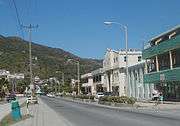 Inland portion of the Waterfront Drive, in Road Town, Tortola
Inland portion of the Waterfront Drive, in Road Town, Tortola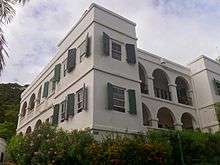 Old Government House
Old Government House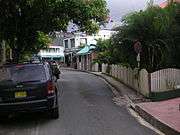 Main Street
Main Street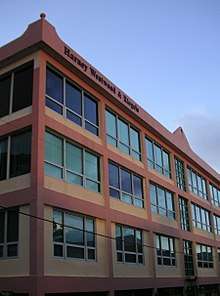 Harney Westwood & Riegels
Harney Westwood & Riegels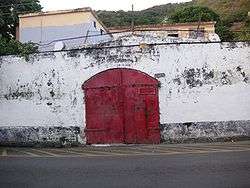 The old HM Prison
The old HM Prison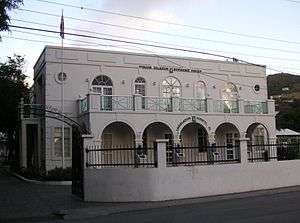 Legislative Council Building
Legislative Council Building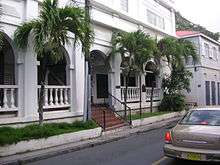 The old Post Office
The old Post Office Conyers Dill & Pearman and Colombian Emeralds
Conyers Dill & Pearman and Colombian Emeralds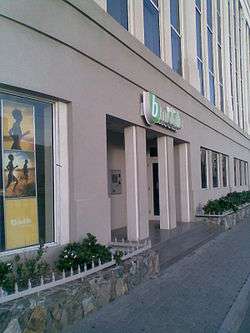 bmobile's headquarters in the BVI
bmobile's headquarters in the BVI- Shop on Main Street
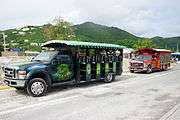 Safari buses
Safari buses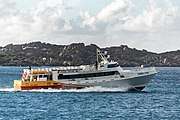 Passenger ferry on scheduled run to Road Town Ferry Terminal
Passenger ferry on scheduled run to Road Town Ferry Terminal
See also
- Government House, the official residence of the Governor of the British Virgin Islands located in Road Town
Notes
- "World Gazetteer". Archived from the original on 9 February 2013.
- "British Virgin Islands Demographics Profile 2019". Retrieved 4 August 2020.
- "Archived copy". Archived from the original on 8 May 2011. Retrieved 3 February 2010.CS1 maint: archived copy as title (link)
- "404". www.cruising.org.
- John M Bryden. Tourism and Development: a case study of the Commonwealth Caribbean. p. 151.
- "A Visit to HM Prison – The Welcome Guide to the British Virgin Islands". www.bviwelcome.com.
- "Virgin Gorda historic weather averages in British Virgin Islands". Intellicast. Retrieved 4 July 2012.
- "Airport & Transportation in the British Virgin Islands". www.b-v-i.com.
- "Hurricane Irma: Damage mapped". BBC News. 12 September 2017. Retrieved 30 May 2018.
External links
| Wikimedia Commons has media related to Road Town. |
| Wikivoyage has a travel guide for Road Town. |